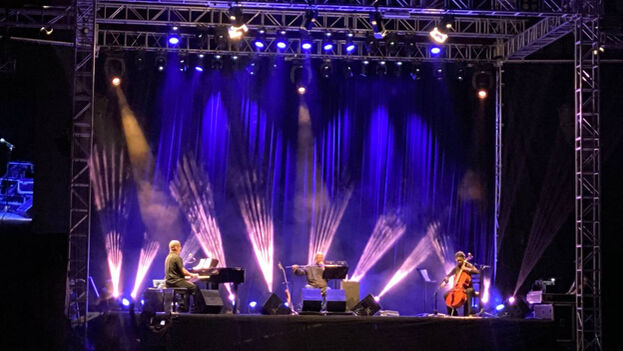
![]() 14ymedio, Juan Diego Rodríguez, Havana, 21 June 2022 — Under a strong police operation, long lines and a thorough review of each person’s belongings before entering the premises, thus began the concert of the Cuban troubadour Pablo Milanés on Tuesday at the Coliseum of the Sports City of Havana. The performance was also marked by the emotion of an audience that had not listened live for several years to the author of songs like Yolanda.
14ymedio, Juan Diego Rodríguez, Havana, 21 June 2022 — Under a strong police operation, long lines and a thorough review of each person’s belongings before entering the premises, thus began the concert of the Cuban troubadour Pablo Milanés on Tuesday at the Coliseum of the Sports City of Havana. The performance was also marked by the emotion of an audience that had not listened live for several years to the author of songs like Yolanda.
From the stage, flanked by two large screens with his face, Milanés sang the song Marginal with which he began a concert that, from its opening minutes, kept the singer-songwriter in tune with the thousands of people gathered at the venue. Años, El pecado original, La soledad, Nostalgias y Días de gloria, were also among the most acclaimed songs during the night.
One of the most emotional reactions of the public occurred when the first chords of Éxodo [Exodus] sounded, which was repeated in chorus by the audience. “Where are the friends I had yesterday? / What happened to them? / What happened? / Where did they go? / How sad I am” was heard from thousands of voices in a country where, in recent months, one of the largest mass exoduses in more than half a century has occurred.
“I want to see them to know that I am human, that I live and feel for my brothers and they for me,” the audience completed the song. For most of the concert the also held their cell phones high while recording Milanés. Another moment of ecstasy occurred when the singer-songwriter sang “There is a people that waits silently / There is a body that I want to undress” from his song Hay [There is], which generated wide shouts of joy from the stands.
Outside the sports center, converted into a concert hall for the occasion, a large uniformed operation and several well-known State Security agents who frequently harass activists and independent journalists could be seen from the early hours of the afternoon. Among them is an officer who identifies himself as Jordan and who is often part of the police cordons to prevent reporters and opponents from leaving their homes.
“This is so full of segurosos (State security agents) that it seems like it’s Barack Obama who’s coming,” joked a young man who decided to walk to the Coliseum in a city where transport difficulties were exacerbated this Tuesday by the thousands of people who sought to approach to the Ciudad Deportiva, a large complex of facilities where the legendary British rock band The Rolling Stones performed in 2016.

Shortly before the start of the performance, a note from the Ministry of Culture posted on Facebook was quick to assure that “everything continues to run normally at the Ciudad Deportiva Coliseum… There is no threat of explosives or incidents. The public enters from 6 pm and the invited press prepares to enter the box. Many spectators have arrived early to the gigantic indoor venue.”
However, several foreign press agencies based on the island reported that they were prevented from accessing the facility. “At the entrance, the security guards told us that we couldn’t film here and that they invited us to leave the place,” a Cuban-accredited reporter who preferred to remain anonymous to avoid reprisals explained to 14ymedio . “They didn’t give us any more explanations, they just told us that we had to withdraw.”
It was also not easy for concertgoers to post photos and videos from the Coliseum because the internet connection remained unstable and at times it was impossible to access the web from the venue. “It could be the number of people gathered that makes the signal drop, but it could also be that they don’t want us to broadcast live,” suggested Fabián, a 23-year-old who attended with a dozen friends.
“We left Central Havana at four in the afternoon and we walked here because we couldn’t even dream of catching a bus,” the young man tells this newspaper. “Along the way there were a lot of people trying to hail a taxi or get on anything with wheels to get here.” The interest in listening to Milanés comes not only from the years that the singer-songwriter had not performed in his native country. “It’s just that Pablito is Pablito,” Fabián insists.
Possessor of a wide repertoire and with a voice that stands out in the broad Cuban musical spectrum, the troubadour has also built a solid reputation for his criticism of the Cuban revolutionary process that he once enthusiastically supported. That position has cost him exclusions, institutional reproaches and a limited diffusion on the Island of his presentations abroad. His Días de luz [Days of Light] tour, which has taken him to stages in Europe and the United States, has barely been commented on in the official Cuban media.
“He sounds wonderful, he has a clear, crisp voice that doesn’t sound old at all. The instruments that accompany him are only two, a pianist and a woman on the cello, but it looks like a symphony,” admired a singer who managed to get a seat near the stage although too close, for her liking, to the speakers. “The best positions are reserved, but I’m not complaining, the important thing is to have been able to be here.”
“People are hypnotized and you can see who are those in the audience who came to control and not enjoy the concert, because they don’t sing,” said Massiel, a Havana native who attended with part of her family. “It was worth the number of hours we had to spend to get here and then stand in line to get in. This is pure vitamin for the soul.”
We must also reference the incident that fueled official anxiety, right in the Ciudad Deportiva during a concert by Carlos Varela on May 29th. At that concert the audience chanted the word “freedom” at various times. At the end of that performance, the singer-songwriter shouted “Viva Cuba libre” and thanked the organizers – with Eme Alfonso at the head – of the event, whom he praised for “having the ovaries” to invite him to sing in Cuba.
Milanés, who has lived in Spain for some time, spoke out with indignation after the repression of the demonstrations on July 11 last year. “I believe in young people, who with the help of all Cubans, must be and will be the engine of change.” The singer-songwriter described as “irresponsible and absurd” the use of repression by the Cuban government against the people, “who have sacrificed themselves and given everything for decades to support a regime, and in the end what it does is imprison them.”
After saying goodbye to the public this Tuesday night, Pablo Milanés returned to the stage acclaimed by the applause and the cries that asked for the concert to continue. “Love me as I am, take me without fear / Touch me with love, I’m going to lose my cool” sang the troubadour before an audience that was reluctant to end a night of reunion and good music.
____________
COLLABORATE WITH OUR WORK: The 14ymedio team is committed to practicing serious journalism that reflects Cuba’s reality in all its depth. Thank you for joining us on this long journey. We invite you to continue supporting us by becoming a member of 14ymedio now. Together we can continue transforming journalism in Cuba.
